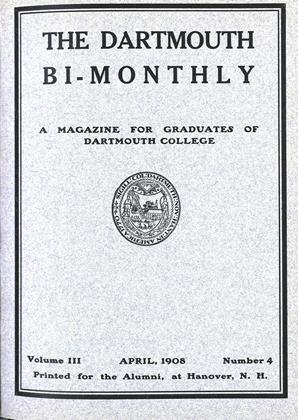Hon. Redfield Proctor, United States Senator from Vermont, died of pleurisy and pneumonia at his apartments at the city of Washington, March 4, 1908, thus closing a long and distinguished career. Senator Proctor was born in the village of Proctorsville, Vt., June 1, 1831, —a village founded by his grandfather, a captain in the Revolutionary army. Jabez Proctor, the father of the Senator, was a successful manufacturer, and took an active part in public affairs. The son engaged in business for a few years after graduation, at first with his father at Proctorsville, and later in Minnesota. He then studied law, graduating at Albany Law School. For a short time he practiced in Boston, in the office of his cousin, the late Chief Justice Isaac F. Redfield '25. At the outbreak of the Civil War he returned to Vermont, and became quartermaster of the Third Regiment, Vermont Volunteers, June 19, 1861, serving for a time on the staff of Gen. W. F. Smith. He was promoted to be major of the Fifth Regiment, Sept. 25, 1861, which position he resigned July 11, 1862, owing to the failure of his health. After the recovery of his health he returned to the service, Sept. 26, 1862, as colonel of the Sixteenth Regiment, and so continued until the regiment was mustered out, Aug. 5, 1863.
On returning to civil life, he entered upon the practice of his profession at Rutland, in partnership with Col. W. G. Veazey '59. In 1869 he gave up practice to become manager of the Sutherland Falls Marble Co., whose affairs had become seriously involved. He soon brought the company out of its difficulties, invested his own means in the concern, and greatly increased its production. In 1880 this company was united with the Rutland Marble Company under the name of the Vermont Marble Company, with Colonel Proctor for its president. The village changed its name to Proctor, and was set off in 1886 as a separate town by the same name. The new company soon became the largest marble producing concern in the world, and has maintained an exceptional prosperity. In 1889 Colonel Proctor surrendered the active management to his son, Fletcher D. Proctor.
Senator Proctor's active political life began with his membership in the Vermont house of representatives from the town of Rutland in 1867 and 1868. In 1874, he was a member of the state senate, and its president pro tempore; lieutenant governor from 1876 to 1878; and governor from 1878 to 1880. In 1884 and 1888 he was a delegate to the Republican national convention, in the latter year being chairman of the Vermont delegation. In 1888 he represented the town of Proctor in the state house of representatives. At the inauguration of President Harrison in March, 1889, he entered that president's cabinet as secretary of war. This office he resigned in November, 1891, to accept an appointment from the governor as United States senator, to succeed Hon. George F. Edmunds, who had resigned his seat. This office he filled by successive re-elections until his death. In the senate he was an infrequent speaker on the floor but a diligent worker in committee, and had large influence in legislation. In the spring of 1898 his speech in the senate after a visit to Cuba was largely instrumental in causing the declaration of war against Spain.
Senator Proctor was married May 26, 1858, to Sarah J., daughter of Salmon Dutton of Cavendish, Vt., who survives him, with two sons and a daughter. One son, Hon. Fletcher D. Proctor, is the present governor of Vermont, and it became his duty to appoint his father's successor in the senate.
The deceased was a liberal giver to public objects. Among his benefactions are a hospital, library, and Y. M. C. A. building in the town of Proctor, and a sanatorium for tuberculous patients, lately erected in the town of Pittsford at an expense of $250,000 and given to his native state.
 View Full Issue
View Full Issue
More From This Issue
Class Notes
-
 Class Notes
Class Notes1956
Jan/Feb 2013 By Joel D. Ash -
 Class Notes
Class Notes1911
February 1954 By NATHANIEL G. BURLEIGH, SARGENT F. EATON, JOHN C. STERLING -
 Class Notes
Class Notes1945
Nov/Dec 2007 By Robert C. Joy -
 Class Notes
Class Notes1905
DECEMBER 1971 By ROGER W. BROWN -
 Class Notes
Class Notes1913
December 1961 By WARDE WILKINS, ROBERT O. CONANT, WILLIAM B. GUMBART -
 Class Notes
Class NotesCLASS OF 1913
February 1916 By Wright Hugus








